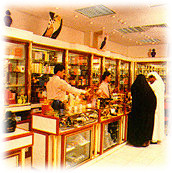The first thing your sense of smell picks up in an Arab house is the heady aroma of Oudh wafting in the air. Oudh is considered as a supreme fragrance in the Gulf countries. In Bahrain, Oudh is burned as a mark of respect and hospitality and is a traditional gesture of welcoming and honouring guests. In fact, Oudh is considered an important feature at most social occasions....[more]

or just Agar is the resinous heartwood from Aquilaria trees, large evergreens native to southeast Asia. The trees occasionally become infected with mold and begin to produce an aromatic resin in response to this attack. As the infection grows, it results in a very rich, dark resin within the heartwood. It is this precious resinous wood that is treasured around the world.
The resin is commonly called Gaharu, Jinko, Aloeswood, Agarwood or Oud and is valued in many cultures for its distinctive fragrance, thus it is used for incense and perfumes....more
Oudh
Scents of the Earth
Aloeswood Attar

Agarwood is the most rare
and precious wood on the planet...[click]
Around the World
The West
Aloeswood/Oudh oil is slowly making an appearance in The West where the majority of people do not know about this natural gift of nature.
Middle East
The Aloeswood oil termed as 'Oudh' in the Middle East is highly valued for its fragrance, it can go upto astonishingly high prices due to the level of demand that exists. It is worn on clothes and skin, mainly used by men during special occasions such as Eid and Friday prayers.
Oman
One of the most prized fragrance items in Oman is oudh, which is imported from Cambodia, India and Malaysia. It is a musky-smelling wood which may be burned or from which oil can be extracted. It is very expensive and only used on important occasions such as Eid, weddings, funerals and to celebrate the birth of a child. The oudh oil will often be given as part of a woman's dowry, together with gold and other gifts.
Japan
The wood is carved as settings for precious stones and Aloeswood is an excellent wood for sculptures and carvings In Japan, Aloeswood is used in a complex fragrance guessing game called koh-do, part of the ceremonial appreciation of incense adopted from the Chinese, who still use the expression wenxiang, "listening to the incense." Japanese Shamans use Aloeswood Oils for its psychoactive properties. They believe enhances mental clarity and opens the third eye as well as all of the upper charkas.
China
There are many stories about Aloeswood being buried under the ground for hundreds of years. This legend comes from an old Chinese book on incense. Aloeswood oil is prized in China for its psychoactive properties.
Buddhist
Used chiefly for Incense for the Mind - during meditation, Agarwood is highly psychoactive. It is used for spiritual journey, enlightenment, clarity and grounding. Buddhists use it for transmutation of ignorance
Tibetan Monks
Tibetan monks use it to bring energy to the center and calm the mind and spirit.
Sufis
The Sufis use Agarwood oil in their esoteric ceremoniesPractitioners Around the World It is recommended by experienced practitioners for providing motivation and devotion to meditation.
...Used to facilitate communication with the transcendent, refreshes the mind and body, drives away evil spirits, takes away exhaustion, removes impurities, expels negative energies, brings alertness, calms the nervous system, relieves anxiety, invokes a sense of strength and peace, creating natural order in your sacred living areas, enhances cerebral functioning, remedies nervous disorders such as neurosis, obsessive behaviour, etc., and it is a companion in solitude. Chinese, Tibetan, Ayurvedic and Unanai physicians have all used Agarwood in their practice to treat various diseases as well as mental illness.Aloeswood Medicinal Uses Stimulant, tonic, nausea, nerves, regurgitation, weakness in the elderly, aphrodisiac, diuretic, relieves epilepsy, antimicrobial, carminative (gas), smallpox, rheumatism, illness during and after childbirth, relieves spasms in digestive and respiratory systems, shortness of breath, chills, general pains, lowers fever, asthma, cancer, colic, digestive and bronchial complaints, abdominal pain, diarrhoea, cirrhosis of the liver and as a director or focuser for other medicines. It has also been used as a treatment for lung and stomach tumours....[more]

Kyara
This is the most famous and well known of all Aloes wood some believe to come from either Vietnam or Cambodia. Kyara is a particular odor described as: "A gentle and dignified smell with a touch of bitterness. The fragrance is like an aristocrat in its elegance and gracefulness." Kiyoko Morita notes in her published work, "The Book of Incense," that opinions differ from incense masters on what is kyara.
more












